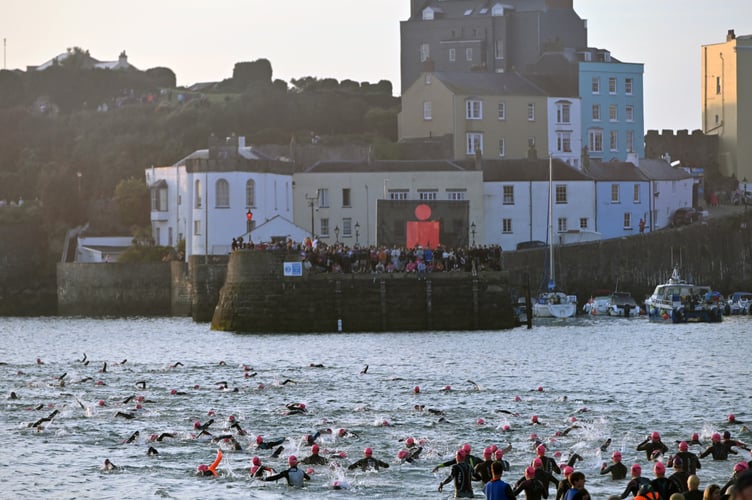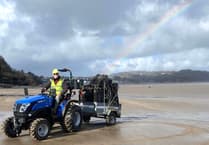Tenby’s North Beach is in line to gain its Blue Flag status back, after bathing water standards moved up from ‘good’ to ‘excellent’ classifications, the Welsh Government has confirmed.
Wales secured high-quality results in 2023 with 98% of designated bathing waters meeting stringent environmental standards.
80 of Wales’ 109 bathing waters achieved the highest classification of ‘excellent’.
An ‘excellent’ classification is one of the essential criteria for obtaining a Blue Flag accreditation, one of the world’s most recognised voluntary eco-labels.
Two beaches at Tenby North and Aberdyfi have moved up from ‘good’ to ‘excellent’ classifications, making them eligible to apply for the coveted Blue Flag status.
Tenby’s North Beach, one of the most popular in Pembrokeshire which hosts the Ironman Wales swim event, lost its Blue Flag status in 2022 after the standard of the bathing water dropped down from being rated as ‘Excellent’ to ‘Good’ after an assessment for 2021 by Natural Resources Wales showed that visible pollution was found in the sea from sewage.

With the threat of closure of the public toilets that serve the beach subsided for now, which would have hindered a chance at regaining the Blue Flag Status, there is still a fear that recent readings of elevated levels of bacteria at the seaside town’s South and Castle Beaches, could threaten their Blue Flag status’.
At a recent meeting of Tenby Town Council, Cllr. Duncan Whitehurst who has been highlighting pollution concerns across the town in recent months, reported back to his fellow councillors on a meeting that had been held of the Tenby Clean Seas Working Group.
He said South Beach and Castle Beach had returned elevated levels of bacteria in June, July and September which could affect their Blue Flags, but none of the agencies at the meeting could identify the cause, and would continue investigations.
Cllr. Whitehurst added that the readings on North Beach were actually better than some of the beaches in the county that had Blue Flags and he was optimistic.
In conclusion, Cllr Whitehurst said it was time for Dŵr Cymru and Natural Resources Wales to conduct further investigations into establishing the source of occasionally poor bathing water quality results and take action to prevent high levels of bacteria in the sea.

“Along with improved testing comes an expectation from the public that the agencies responsible identify the cause and take action to put it right,” he said.
“Dŵr Cymru and NRW have made specific efforts to do this, and most of the time, our seas are safe to swim in. However, while some of our beaches continue to fail basic water quality standards, more work needs to be done,” he added.
Climate Change Minister for the Welsh Government, Julie James, said: “Wales is recognised internationally as having some of the best beaches and water quality in Europe, and high bathing water quality is vital to continue supporting valuable outdoor water recreation opportunities.
“We will continue to work with local communities and water companies to identify what action is needed to meet and exceed the required standards.”
Clare Pillman, Chief Executive of Natural Resources Wales, said: “We are entirely committed to protecting and improving the quality of our coastal waters and rivers for people and nature, and each year, a tremendous amount of unseen work takes place to tackle sources of pollution across the country.
“While we celebrate our spectacular coastline and world-class beaches, we know that now is a pivotal time for change, not complacency.
“There is still much work to be done to safeguard our bathing waters. The only way to get our water quality to the state we want is to recognise that everyone has a role to play. We must all raise our game now and strive to achieve the waters we want for ourselves and for future generations.”
Bathing water quality reporting is highly perceptible to climatic changes, in particular, periods of heavy rainfall and with our changing climate, we must be prepared to deal with impacts of longer, heavier bouts of rain on a regular basis.

Wales already receives more rainfall on average than other parts of the UK and this year was no exception.
In July, Wales received 191% of its long-term average rainfall and was followed by 125% during August and September.
Last year, over the same period, Wales experienced the driest seven-month period in 150 years.
The Minister added: “We know that improvements can take time, but even the smallest steps can help to protect and strengthen our water quality in Wales.
“While progress has been made, there is still much more to be done to ensure cleaner and healthier waters for people to enjoy.”



